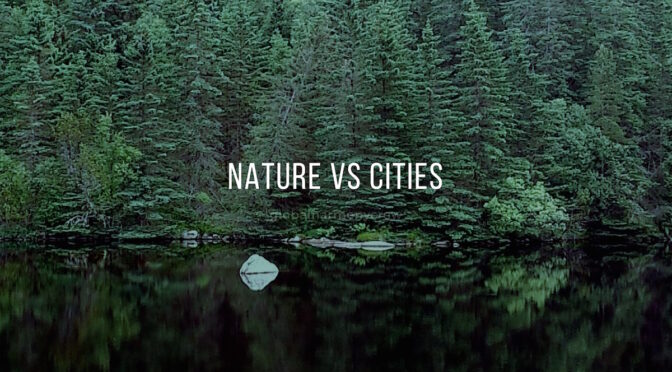I recently escaped the city life for a weekend. Into the forest I went, to a cabin with no running water or electricity. My whole system gradually unwound itself as I slowed down, let go of stress, and reconnected with nature. A sense of inner peace returned to me, and I felt rejuvenated for a long time.
In the city, just looking at the trees in the beautiful park outside my window brings me pleasure. Watching the newly sprouted leaves dance in the wind puts a smile on my face.
If you are like me, a walk through the park allows you to relax and enjoy the present moment. A growing body of research gives us deeper insight into the processes behind this, and the health benefits associated with being in nature.
________________________________________
 Urban life is a fairly new concept for our species. During most of our evolution we have been living in close contact with nature.
Urban life is a fairly new concept for our species. During most of our evolution we have been living in close contact with nature.
Sure, we have had great civilizations and big-cities for several thousand years, but not the noisy concrete jungles we have today. Nevertheless, cities are great hubs for novel ideas and new technologies. They gather a lot of human resources in one place.
City life, despite its benefits, is associated with higher rates of mental illness, including depression. Research suggests several ways to increase nature-induced well-being, even in cities. Having a view with natural elements, such as trees, seems to impact well-being [1]. Inner city children who have a natural view from their home seem to have higher levels of self-discipline [2].
If you are spending all of your time deep in the urban jungle, chances are you are stressed out. You are pacing concrete sidewalks in the valleys between skyscrapers, eyes-glued to a cell-phone, thoughts locked on how to make it to work in time despite the huge traffic jam of people on the subway. This myriad of impressions can make you worry and think negative thoughts.
“This is not optimal for your health.” – Captain Obvious
One study by Stanford scientist Gregory Bratman proposes a simple yet effective way to calm your mind. When you worry and think negative thoughts there is increased activation in a part of your brain called the subgenual prefrontal cortex.
Bratman’s study showed that a 90-minute walk in a quiet, green park in Stanford decreased both neural activity in this region and self-reported rumination [3], whereas a 90-minute walk next to a hectic highway in Palo Alto had no such effects. Another study showed increased working memory performance and decreased anxiety after a 50-minute walk in a natural environment compared to a 50-minute walk in a rural environment [4].
These results bear a striking resemblance to some of the benefits found in studies on meditation.
Sitting by a lake – with its tranquil ripples – offers you clarity, bliss, and peace. Looking at a waterfall – with its white noise, and ever-changing yet constant appearance – offers you serenity and a sense of satisfaction. Parks offer equivalent meditative experiences in a city, and can have major effects on people’s well-being and health.
After his awakening, Eckhart Tolle spent the most of two years sitting, in a state of bliss, on a park bench in London.
Walks in nature give you a synergy of the effects from fresh air, reduced rumination, exercise, and perhaps sunlight. This affects the brain in several ways. Exercise releases a range of health- and happiness-boosting brain chemicals such as endorphins, serotonin, and dopamine. Sunlight gives you endorphins, serotonin, and vitamin D. All of these boost your mood and your health.
Enjoy the beneficial effects of more nature in your life by getting out of the city, eating your lunch in a park, or getting some indoor plants. We are part of nature – let us reconnect with ourselves by making natural elements a bigger part of our daily lives.
________________________________________
Vegard Paulsen is one of the two founders of Global Harmony Crew.
Global Harmony Crew helps people uncover their true selves and live a life full of meaning and happiness.
Check out their Udemy courses on how to stimulate the release of happiness-enhancing brain chemicals, and how to become a master of your inner peace:
Control Your Brain Chemistry – Become Confident and Creative
Master Your Inner Peace – Remain Positive and Unaffected
To get “Master Your Inner Peace” for free, join the crew by subscribing.
Follow Global Harmony Crew on Facebook.
________________________________________
Resources:
[1] Rachel Kaplan, 2001,”The Nature of the View from Home, Psychological Benefits”. Environment and Behavior July 2001 vol. 33 no. 4 507-542. Found here: http://eab.sagepub.com/content/33/4/507.abstract
[2] ANDREA FABER TAYLOR, FRANCES E. KUO, WILLIAM C. SULLIVAN, 2002, “VIEWS OF NATURE AND SELF-DISCIPLINE: EVIDENCE FROM INNER CITY CHILDREN”. Journal of Environmental Psychology, Volume 22, Issues 1–2, March 2002, Pages 49–63. Found here: http://www.sciencedirect.com/science/article/pii/S0272494401902415
[3] Gregory N. Bratman, et. al., 2015, “Nature experience reduces rumination and subgenual prefrontal cortex activation”. Found here: http://www.pnas.org/content/112/28/8567.abstract
[4] Gregory N. Bratman, et. al., 2015, “The benefits of nature experience: Improved affect and cognition”. Landscape and Urban Planning, Volume 138, June 2015, Pages 41–50. Found here: http://www.sciencedirect.com/science/article/pii/S0169204615000286

